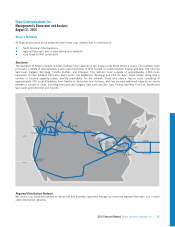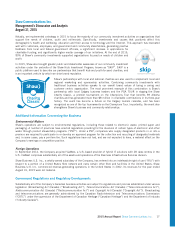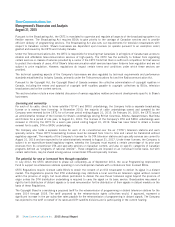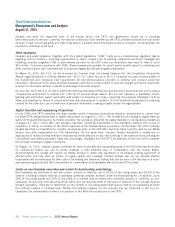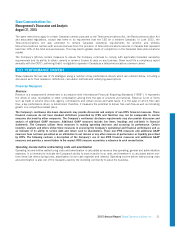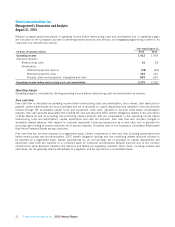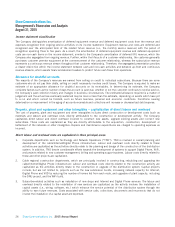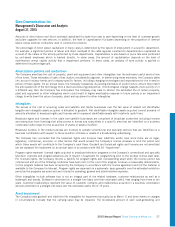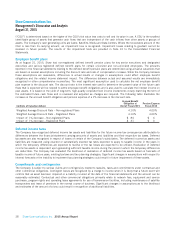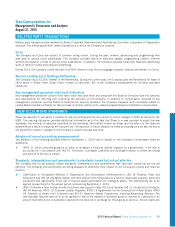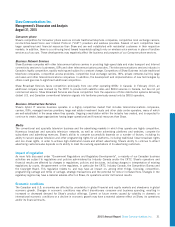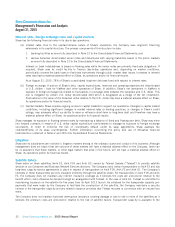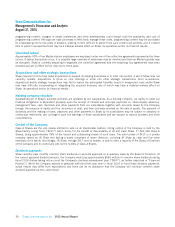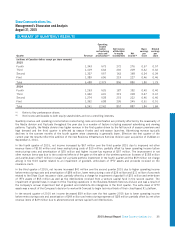Shaw 2015 Annual Report Download - page 27
Download and view the complete annual report
Please find page 27 of the 2015 Shaw annual report below. You can navigate through the pages in the report by either clicking on the pages listed below, or by using the keyword search tool below to find specific information within the annual report.
Shaw Communications Inc.
Management’s Discussion and Analysis
August 31, 2015
The Media division’s subscriber revenue is recognized monthly based on subscriber levels. Advertising revenues are recognized
in the period in which the advertisements are aired or displayed on the Company’s digital properties and recorded net of agency
commissions as these amounts are paid directly to the agency or advertiser. When a sales arrangement includes multiple
advertising spots, the proceeds are allocated to individual advertising spots under the arrangement based on relative fair values.
Subscriber connection fee revenue
Connection fees have no standalone value to the customer separate and independent of the Company providing additional
subscription services, therefore the connection fee revenue must be deferred and recognized systematically over the periods
that the subscription services are earned. There is no specified term for which the customer will receive the related subscription
service, therefore the Company has considered its customer churn rate and other factors, such as competition from new
entrants, to determine the deferral period of three years.
Subscriber connection and installation costs
The costs of physically connecting a new home are capitalized as part of the Company’s distribution system as the service
potential of the distribution system is enhanced by the ability to generate future subscriber revenue. Costs of disconnections are
expensed as incurred as the activity does not generate future revenue.
Customer premise equipment revenue and costs
Customer premise equipment available for sale, which generally includes DCT and DTH equipment, has no standalone value to
the customer separate and independent of the Company providing additional subscription services. Therefore the equipment
revenue is deferred and recognized systematically over the periods that the subscription services are earned. As the equipment
sales and the related subscription revenue are considered one transaction, recognition of the equipment revenue commences
once the subscriber service is activated. There is no specified term for which the customer will receive the related subscription
service, therefore the Company has considered various factors including customer churn, competition from new entrants, and
technology changes to determine the deferral period of three years.
In conjunction with equipment revenue, the Company also incurs incremental direct costs which include equipment and related
installation costs. These direct costs cannot be separated from the undelivered subscription service included in the multiple
deliverable arrangement. Under IAS 2 “Inventories”, these costs represent inventoriable costs and are deferred and amortized
over the period of three years, consistent with the recognition of the related equipment revenue. The equipment and installation
costs generally exceed the amounts received from customers on the sale of equipment (the equipment is sold to the customer at
a subsidized price). The Company defers the entire cost of the equipment, including the subsidy portion, as it has determined
that this excess cost will be recovered from future subscription revenues and that the investment by the customer in the
equipment creates value through increased retention.
Shaw Tracking equipment revenue and costs
Shaw Tracking equipment revenue is recognized over the period of the related service contract for airtime, which is generally
five years.
In conjunction with Shaw Tracking equipment revenue, the Company incurs incremental direct costs including equipment
costs. These direct costs cannot be separated from the undelivered tracking service included in the multiple deliverable
arrangement. Under IAS 2 “Inventories”, these costs represent inventoriable costs and are deferred and amortized over the
period of five years, consistent with the recognition of the related tracking equipment revenue.
Shaw Business installation revenue and expenses
The Company also receives installation revenues in its Shaw Business operation on contracts with commercial customers which
are deferred and recognized as revenue on a straight-line basis over the related service contract, generally spanning two to ten
years. Direct and incremental costs associated with the service contract, in an amount not exceeding the upfront installation
revenue, are deferred and recognized as an operating expense on a straight-line basis over the same period.
2015 Annual Report Shaw Communications Inc. 25


